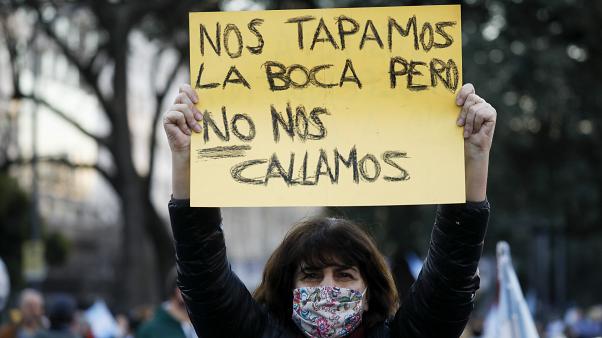RIO DE JANEIRO, BRAZIL – Thousands of demonstrators across Argentina’s main cities defied social distancing rules to answer calls to protest against a government announcement last Friday to extend containment measures in the Buenos Aires region until August 30th, and to condemn a controversial reform of the judicial branch.
Demonstrators in the Argentine capital shouting “freedom, freedom” gathered around the landmark Obelisk in central Buenos Aires, waving Argentine flags and chanting anti-government slogans.
Demonstrators also protested against President Alberto Fernandez’s planned judicial reform that would expand the number of federal courts and increase the number of Supreme Court magistrates, in an effort to dilute the influence of judges suspected of making politically motivated decisions.

However, the “reform” bill, which was sent to Congress without consulting political forces, as had been promised, is seen as an attempt, by current Vice-president and twice former President Cristina Fernandez, to have her several corruption court cases dropped, as well as those involving some of her political, financial allies and alleged partners in crime.
The protests in Buenos Aires and other main cities took place despite a recent easing of restrictions, even as the country battles a steady rise in infections.
Earlier, President Fernandez, whose judicial reform plans were a key part of his election campaign, called for unity in a speech commemorating Argentine independence leader José de San Martín.
“We have lived a unique moment of humanity, not just in Argentina, where a pandemic is besieging us, infecting us, sickening us, killing us,” he said.
The task ahead was to rebuild a country that has been “economically annihilated,” by liberal centre-right governments. “They have left behind an impressive amount of debt, they have conditioned the future of many generations and they have plunged more than 40% of Argentines into poverty,” Fernandez said.
“United I am sure we will win,” said Fernandez, paraphrasing San Martín.
The government imposed a nationwide quarantine on March 20th (over 150 days ago), before gradually easing it in much of the country. It also launched a multi-million dollar package of social and business aids to shore up an economy that has been in recession since 2018, and with zero growth from 2012, udner the second government of ex-President Cristina Fernandez.
Protests point to the fact that despite such a long quarantine, according to the latest health figures, Argentina has recorded nearly 300,000 infections and 5,750 deaths from the coronavirus, while reporting more than 5,000 new cases a day for the past week.
Although there were no incidents reported, and most protestors wore face masks but did not necessarily keep the 2 meters social distancing rules, an uncommon situation took place when several hundred demonstrators marched to the flat of Cristina Fernandez, beating pots and pans, plus calling for jailing all “corrupt politicians”.
Furthermore a neighbor from the same flats building displayed a huge banner along its terrace with the Argentine flag colors and in black letters said, “Democratic Argentine Republic”.
This was the third and largest demonstration against the eight-month-old Fernandez administration, all of them on national holidays, so-called “flag waving” days: June 20th (Flag Day); July 9th (Independence Day); and August 17th, anniversary of the death of Argentina’s Liberator, José de San Martín. None of these rallies had ever had a political party or grouping identification, and the call to participate was basically spontaneous through social networks.
Source: MercoPress

